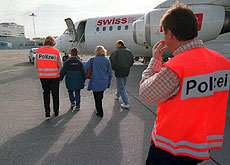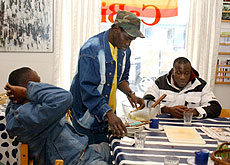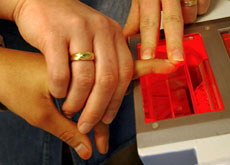Asylum seekers promised tough but fair deal

The head of the new Federal Migration Office says Switzerland will always be a refuge for persecuted people, despite tighter asylum laws.
Eduard Gnesa – who took up his post at the beginning of the year – told swissinfo that for Switzerland the challenge was to integrate its immigrant population better, particularly those from the Balkans.
Parliament has been discussing amendments to the immigration and asylum laws which, if approved, would make them among the toughest in Europe.
The Senate backed controversial proposals to speed up the asylum procedure and pressure rejected asylum seekers to leave Switzerland.
At the same time the Federal Court ruled that the authorities must not cut emergency aid as a means to drive away rejected asylum seekers.
The Federal Migration Office was created through the merger of the refugee and immigration authorities.
swissinfo: Has Switzerland’s humanitarian image not been damaged by the Senate decisions?
Eduard Gnesa: People who are persecuted or come from a conflict zone will always find protection in Switzerland.
We have about 24,000 people with regular refugee status in this country and another 24,000 people with temporary refugee status. They can stay until the situation in their home countries improves.
The problem we have, which many people – the churches and humanitarian organisations – don’t want to recognise, is the approximately 15,000 people who have not been granted asylum and refuse to leave Switzerland. They don’t tell us who they are or where they come from, so we can’t send them back.
swissinfo: A year ago the federal authorities drastically cut welfare payments to rejected asylum seekers. How successful has this measure been in persuading them to leave?
E.G.: Figures for the first nine months show that only 17 per cent of the rejected 3,800 asylum seekers claimed emergency aid after their welfare benefits were cut.
Of course, the government and parliament will have to take into account a recent ruling by the Federal Court that rejected asylum seekers remain eligible for emergency aid even if they refuse orders to leave the country.
swissinfo: Critics have argued that a tightening of the asylum law will cause people to go underground and get caught up in crime. Are these concerns justified?
E.G.: A survey carried out by the Federal Immigration Office showed no significant increase in the number of criminal asylum seekers. Only about five per cent of the 3,800 rejected applicants committed – mostly petty – crimes. The percentage is lower than among those who are still going through the asylum procedure.
As for people going underground, we don’t have reliable figures yet. Even before the welfare payment was cut we had an estimated 10,000 people each year who disappeared from our records after their asylum request was rejected. They might have left the country or have stayed as illegal immigrants.
swissinfo: Asylum applications reached a 17-year low in 2004 in line with a general trend in Europe. Will your office run out of work soon?
E.G.: Not at all, but more job cuts are inevitable by the end of this year.
Our work has been changing in the past few months and we might have to focus more on repatriation efforts or helping the cantonal authorities deal with embassies to provide identity papers.
We also have to step up efforts to better integrate recognised refugees into the Swiss labour market. Currently only about 20 per cent of them have jobs.
swissinfo: Apart from the asylum law, parliament is also amending immigration rules. What are the main decisions?
E.G.: Parliament has endorsed a system introduced in 2002 which gives preference to European Union citizens and highly skilled workers from other countries. It’s a fact that we have had integrations problems with people who are not very well qualified.
swissinfo: How important is the forthcoming nationwide vote on closer security and asylum cooperation with the EU, the so-called Schengen/Dublin accords?
E.G.: Police cooperation will facilitate visa regulations and increase security. As for the Dublin accord, it will help to improve the situation in the asylum sector and make it impossible for asylum seekers to apply to more than one of the signatory countries.
But it might take some time before the system works. It was introduced just over two years ago and not all the member countries cooperate fully or feed their data into the system as required.
swissinfo: Is Switzerland struggling to integrate its foreigners as was suggested in a nationwide vote on easing strict citizenship rules?
E.G.: The result of last September’s vote showed that the perception of foreigners in Switzerland was influenced by integration problems and especially cases of abuses of our laws.
By that I mean rejected asylum seekers who refuse to leave the country, or criminal foreigners. They only make up a small part of the overall foreign population but it seems to be enough to make the Swiss vote against proposals to ease citizenship rules for young foreigners.
swissinfo: What needs to be done?
E.G.: I think we have to make it clear to foreigners that they have to respect our laws.
But at the same time our integration efforts have to be more focused, especially on people from Balkan countries – the biggest immigrant community in Switzerland.
We are not pointing the finger at them and the majority are very well integrated into the Swiss society. But some just don’t respect the rules and refuse to accept an authority.
swissinfo-interview: Urs Geiser
Eduard Gnesa took over the newly formed Federal Migration Office at the beginning of 2005.
It was created by merging the Federal Refugee and the Immigration Office.
The Migration Office has 700 employees and deals with asylum, immigration and integration issues.
There are about 48,000 people with regular or temporary refugee status in Switzerland.
Another 15,000 have had their asylum requests rejected but remain in the country as illegal immigrants.
Asylum applications in Switzerland reached a 17-year low at the end of 2004.
Switzerland’s 1.5 million foreigners make up just over 20% of the resident population.
Foreigners account for 25% of the workforce.

In compliance with the JTI standards
More: SWI swissinfo.ch certified by the Journalism Trust Initiative




You can find an overview of ongoing debates with our journalists here. Please join us!
If you want to start a conversation about a topic raised in this article or want to report factual errors, email us at english@swissinfo.ch.